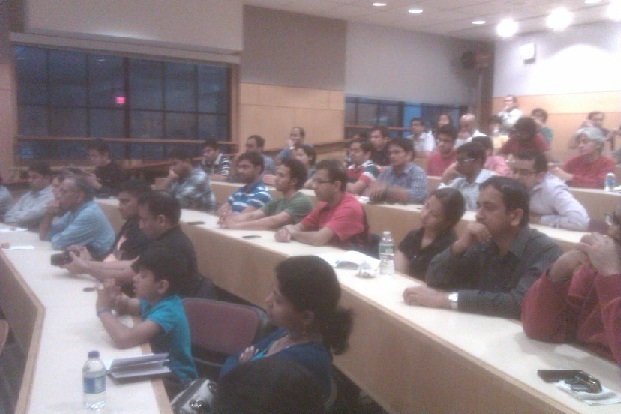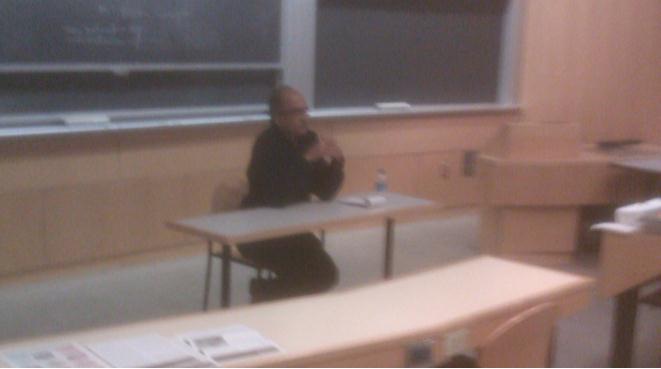Contribute
| A Reflection On Anti-Corruption Movement In India- Talk By Mr. Prashant Bhushan |
Press Release
04/22/2012
On 23rd March, Mr. Prashant Bhushan, an advocate with the Supreme Court of India and a social activist, gave a talk on recent rise in corruption in India, the reasons that led to it, and how it could be tackled at the ground level. The talk was organized at MIT by Association for India’s Development (AID) Boston. The room was packed with about 70 community members from the greater Boston area. The goals of the talk were to raise awareness of social and economic change in India, to promote greater participation in international dialogue and exchange and, by doing so, to strengthen the social and economic change movement locally, nationally and internationally. The talk was followed by an hour of in-depth Q&A discussion.
Bhushan has been a key participant in the anti-corruption movement in India. The chief legislative aim of the movement has been to confront corruption in the Indian government through the Jan Lokpal Bill. He has fought the case against the mining scam in Karnataka and has filed more than 500 public interest litigations. He has been a social activist who has been fighting against corruption, arbitrary land-acquisition, displacement of people, privatization of national resources, as well as many other issues in India for the last 30 years.
Bhushan started off by highlighting the rise of corruption in the last few decades, starting with the Bofors in the 1980s. One factor he mentioned was privatization and liberalization of the country’s natural resources such as minerals, forests and wireless spectrum, which created huge incentives for corruption. These resources were distributed to private companies without any transparent
competitive bidding. The Bellary mining scam and the first-come-first-serve irrational auctioning in the 2G spectrum are examples of this. The people who have easy access to government will ultimately corner these resources. Once privatization happens, the private beneficiaries also tend to have a lot of power and influence at the state level operations, ultimately making it very difficult to act against them. The Reddy Brothers in Karnataka were mentioned as an example.
Bhushan also pointed out the interconnected problems of privatization, exaggerated or fake GDP growth, displacement of people, destruction of environment and natural resources. The question is whether all of this has helped the common person in India even after pushing for privatization in the last decade? Has the human development index of people improved?
Another concern Bhushan pointed out was the autonomy of monitoring anti-corruption agencies like CBI (Central Bureau of Investigation). Abuse of power can also be found in cases against Mayawati and Mulayam Singh Yadav which are still pending as they support central government at some level. Another example is judiciary which encompasses high court judges, who are not accountable to any one, not covered by Right to Information (RTI) filing, and are protected by the fear of contempt of court. There is a need for independent agencies (both functionally and administratively) such as the proposed Jan Lokpal.
Bhushan described a few of the advantages of Lokpal such as rapid actions against cases, independent functioning and financing, and giving power back to the common person. Its accountability is on other hand ensured by public domain nature of investigation, working with enquiry committee if any complaints are filed against the Lokpal, at a state level and also by the independent auditor appointments by the Supreme and High courts. A variant of the bill was ultimately passed in Lok Sabha. Bhushan pointed out the compromises made on the selection committee by being government heavy, financial rulings a part of national budget, excluding members of parliament and high level rankings from its jurisdiction.
Bhushan pointed out that representative democracy was adopted at a time when it was not possible to be able to collect peoples’ point of view. The meaning of democracy, on the other hand, is now compromised by a system of coercive elections. Could a poll or voice of people be heard through referendums while framing a legislation? Responding to a question, he added that referendums cannot be held on fundamental rights, as they are protected by the constitution like the rights of the minority. He emphasized the need for passing a bill that addresses the issues mentioned above.
In summary, though we have had 64.5 years of independence today, we are way behind in giving independence for many Indians who have never benefited from policies and development of India. Let us get together to spread the word, exchange ideas, and educate others about the issues and problems of corruption, all to help the common person.
Videos from the talk are available here:
Part I
Part II
You may also access this article through our web-site http://www.lokvani.com/


Mr. Prashant Bhushan while giving a talk at MIT